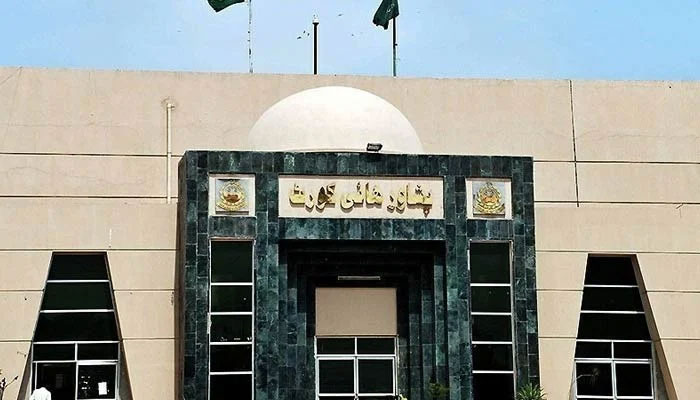PHC questions PTI leader’s inclusion in stop list
The petitioner wishes to appear in court, but there is fear that he may be arrested before appearing in court
PESHAWAR: Peshawar High Court (PHC) has issued notices to the Federal Investigation Agency (FIA), federal government, and other relevant authorities to respond within 10 days to a petition challenging the inclusion of Pakistan Tehreek-e-Insaf (PTI) leader and former provincial minister Kamran Bangash’s name in the stop list.
The case was heard by a two-member bench comprising Justice Shakil Ahmad and Justice Sahibzada Asadullah.Advocate Ali Zaman, representing the petitioner, informed the court that the name of Kamran Bangash had been included in the stop list for the past two months, while Bangash is currently traveling for Umrah.
After completing the arguments, the court directed the federal government and parties concerned to respond to the petition within 10 days. The hearing of the case has been adjourned until April 4.
Meanwhile, in another case the Peshawar High Court (PHC) has granted transit bail to Member National Assembly Zain Qureshi, a son of Pakistan Tehreek-e-Insaf (PTI) leader Shah Mahmood Qureshi, and ordered him to appear before the relevant court.
The case was heard by Peshawar High Court Chief Justice Muhammad Ibrahim Khan. On the occasion, petitioner Zain Qureshi and his lawyer Ali Zaman advocate appeared before the court. The petitioner’s lawyer stated that there were 13 cases registered against his client in various cities of the country.
“The petitioner wishes to appear in court, but there is fear that he may be arrested before appearing in court,” he said. He requested the court to grant him protective bail so that he could face the cases.
Upon hearing the arguments, the court approved the bail of Zain Qureshi in 13 cases on a surety bond of one hundred thousand rupees and ordered him to appear before the relevant courts.
-
 Prince William Steps In To Help Farmer's Awareness Mission
Prince William Steps In To Help Farmer's Awareness Mission -
 Queen Elizabeth Tied To Andrew's Sexual Abuse Case Settlement: Report
Queen Elizabeth Tied To Andrew's Sexual Abuse Case Settlement: Report -
 Mark Ruffalo Urges Fans To Boycott Top AI Company Boycott
Mark Ruffalo Urges Fans To Boycott Top AI Company Boycott -
 Prince William Joins Esports Battle In Saudi Arabia
Prince William Joins Esports Battle In Saudi Arabia -
 Princess Beatrice, Eugenie Are Being Ripped Apart: ‘Their Relationship Is Fully Fractured’
Princess Beatrice, Eugenie Are Being Ripped Apart: ‘Their Relationship Is Fully Fractured’ -
 Arden Cho Shares Update On Search For ‘perfect’ Wedding Dress Ahead Of Italy Ceremony
Arden Cho Shares Update On Search For ‘perfect’ Wedding Dress Ahead Of Italy Ceremony -
 Ariana Madix Goes Unfiltered About Dating Life
Ariana Madix Goes Unfiltered About Dating Life -
 Prince William Closes Saudi Arabia Visit With Rare Desert Shot
Prince William Closes Saudi Arabia Visit With Rare Desert Shot -
 Priyanka Chopra Breaks Silence On Rumors Questioning Marriage To Nick Jonas
Priyanka Chopra Breaks Silence On Rumors Questioning Marriage To Nick Jonas -
 'King Charles Acts Fast Or Face Existential Crisis' Over Andrew Scandal
'King Charles Acts Fast Or Face Existential Crisis' Over Andrew Scandal -
 Brooklyn Beckham Charging Nearly £300 In Ticket Cost For Burger Festival
Brooklyn Beckham Charging Nearly £300 In Ticket Cost For Burger Festival -
 Prince William Makes Unexpected Stop At Local Market In Saudi Arabia
Prince William Makes Unexpected Stop At Local Market In Saudi Arabia -
 Zayn Malik Shares Important Update About His Love Life
Zayn Malik Shares Important Update About His Love Life -
 James Van Der Beek's Celebrity Pals Pen Touching Tribute After His Death
James Van Der Beek's Celebrity Pals Pen Touching Tribute After His Death -
 Kate Middleton, William Are Holding Onto Their Hats As Worse Gets Threatened: Behind The Veil Of Shame
Kate Middleton, William Are Holding Onto Their Hats As Worse Gets Threatened: Behind The Veil Of Shame -
 British Soap Awards Scrapped Again As ITV Confirms 2026 Hiatus
British Soap Awards Scrapped Again As ITV Confirms 2026 Hiatus




